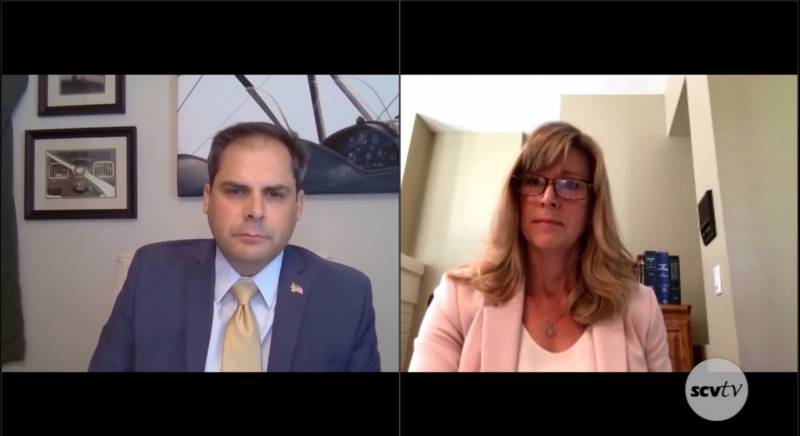In 2018, Democrats picked up seven House seats in California — running campaigns that attacked Republican incumbents for their votes to repeal the Affordable Care Act.
Katie Hill, among that group, resigned her seat in October amid allegations of an improper sexual relationship with a congressional aide (which she denied) and after conservative outlets published nude photos of her.
In the special election to fill Hill’s seat, Democrats are again running on a platform to expand health care coverage. The spread of the coronavirus, which has claimed more than 1,000 lives in Los Angeles County, has further clarified the issue’s importance, Smith said.
“Easy access to health care is a huge priority for me, as is adding a public option,” Smith said. “I think this moment, more than any other in my lifetime, certainly speaks to the need for everybody to be able to have health care as a human right.”
Garcia, a former Navy fighter pilot, who declined to be interviewed, has advocated for repealing the Affordable Care Act. In a 2019 interview with “The Talk of Santa Clarita” podcast, he called it “flawed enough to start over.”
In response, the Democratic Congressional Campaign Committee spent nearly $1 million on a local cable ad attacking Garcia’s health care positions, while declaring that “more than ever, we need a leader who will put our health and safety first.”
But eager to retake the seat, Republicans are leveraging the coronavirus-induced economic crash to sharpen their focus on Smith’s most controversial vote in the state Legislature: her support of Assembly Bill 5, which limits the number of California workers who are classified as independent contractors, rather than employees.
“We need to make it easier right now for the gig economy to restart — to have independent contractors be able to go to work in whatever capacity they can during the stay at home,” Garcia said last week, during the lone debate of the special election campaign, which took place via video conference.
An ad buy from the National Republican Congressional Committee on cable and broadcast TV slammed Smith for “threatening jobs” with her vote, and asked voters to “imagine her recklessness during these frightening times.”
During the debate, Smith responded that if companies aren’t classifying workers as employees, they aren’t paying into “the very critical programs that we are trying to utilize in this exact moment, like our state’s unemployment insurance.”
Holding elected office has given Smith opportunities to project leadership during the pandemic. She’s held volunteer events in the district and was among the bipartisan group of assemblymembers who convened in Sacramento last week to demand more say in how Gov. Gavin Newsom’s administration is spending money in response to the crisis — moves her campaign was quick to tout in an ad unveiled on Wednesday.
“It’s a time when what we need is leaders who are willing to step up and roll up their sleeves and get to work,” Smith said. “And so when I was called by my local senior center to say, ‘Hey, could you come spend an afternoon with us handing out meals for our Meals on Wheels program?’ I was all in.”

